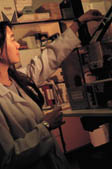 Waiting
to exhale "We've had a lot of disappointments in the field of chemoprevention for lung cancer," Witschi notes. "In the late 1970s they initially thought beta carotene reduced the risk of lung cancer in smokers. But when they tested it further, they found it actually increased the risk of lung cancer." Finding an effective anti-cancer regimen would be especially useful for people who are at high risk of developing cancer. "Even the heaviest smokers don't all get lung cancer. A smaller number, perhaps 20 percent of smokers, are genetically inclined to get the disease," Witschi adds. The newly smoke-free would also benefit. Statistically, the risk of lung cancer increases in smokers the first three years after quitting, after which it levels out, eventually becoming the same as if the person had never smoked. Most researchers explain this blip by pointing out that many smokers quit once they have developed chronic fatigue and a nagging cough - signs they've already got the disease. No treatment exists to reduce the risk of lung cancer in smokers most vulnerable to it. "Our observation that myoinositol and dexamethasone were highly effective in mice who had 'quit' smoking may be of practical significance," Witschi says. "Chemoprevention administered at this moment might reduce this temporary increase in risk." Nothing, of course, compares to the premier chemoprevention strategy of not smoking in the first place, but for the estimated 40 million Americans who have quit smoking, Witschi's research is good news, indeed.
Home |
Table of Contents |
To our Readers |
Building on Basics UC Davis Health System | © 2000, 2001, 2002 UC Regents. All rights reserved. |
Above: Research assistant Kristy Cheng prepares special research cigarettes for use. |

